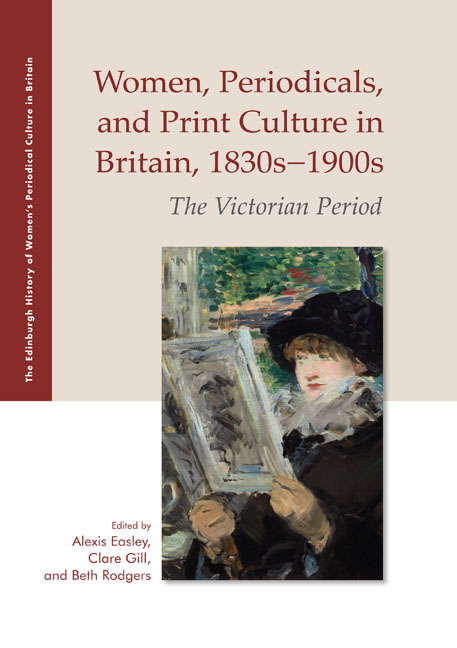Book contents
- Frontmatter
- Contents
- List of Illustrations
- Acknowledgments
- Introduction: Women, Periodicals, and Print Culture in the Victorian Period
- Part I (Re)Imagining Domestic Life
- Part II Constructing Modern Girls and Young Women
- Constructing Modern Girls and Young Women: Introduction
- 7 Promoting a Do-It-Yourself Spirit: Samuel Beeton's Young Englishwoman
- 8 Claiming Medicine as a Profession for Women: The English Woman's Journal's Campaign for Female Doctors
- 9 Encouraging Charitable Work and Membership in the Girls’ Friendly Society through British Girls’ Periodicals
- 10 ‘Welcome and Appeal for the “Maid of Dundee”’: Constructing the Female Working-Class Bard in Ellen Johnston's Correspondence Poetry, 1862–1867
- 11 The Editor of the Period: Alice Corkran, the Girl's Realm, and the Woman Editor
- 12 The ‘Most-Talked-Of Creature in the World’: The ‘American Girl’ in Victorian Print Culture
- Part III Women and Visual Culture
- Part IV Making Space for Women
- Part V Constructing Women Readers and Writers
- Part VI Intervening in Political Debates
- Notes on Contributors
- Index
- Plate section
10 - ‘Welcome and Appeal for the “Maid of Dundee”’: Constructing the Female Working-Class Bard in Ellen Johnston's Correspondence Poetry, 1862–1867
from Part II - Constructing Modern Girls and Young Women
Published online by Cambridge University Press: 25 October 2019
- Frontmatter
- Contents
- List of Illustrations
- Acknowledgments
- Introduction: Women, Periodicals, and Print Culture in the Victorian Period
- Part I (Re)Imagining Domestic Life
- Part II Constructing Modern Girls and Young Women
- Constructing Modern Girls and Young Women: Introduction
- 7 Promoting a Do-It-Yourself Spirit: Samuel Beeton's Young Englishwoman
- 8 Claiming Medicine as a Profession for Women: The English Woman's Journal's Campaign for Female Doctors
- 9 Encouraging Charitable Work and Membership in the Girls’ Friendly Society through British Girls’ Periodicals
- 10 ‘Welcome and Appeal for the “Maid of Dundee”’: Constructing the Female Working-Class Bard in Ellen Johnston's Correspondence Poetry, 1862–1867
- 11 The Editor of the Period: Alice Corkran, the Girl's Realm, and the Woman Editor
- 12 The ‘Most-Talked-Of Creature in the World’: The ‘American Girl’ in Victorian Print Culture
- Part III Women and Visual Culture
- Part IV Making Space for Women
- Part V Constructing Women Readers and Writers
- Part VI Intervening in Political Debates
- Notes on Contributors
- Index
- Plate section
Summary
ELLEN JOHNSTON, A SCOTTISH poet and power-loom operative, gained regional fame for the numerous poems and verse conversations she published in workingclass newspapers in Scotland. This led to the publication of two editions of her collected poetry (1867, 1869), both of which included brief autobiographical narratives. The majority of Johnston's verses are overtly autobiographical and vary in genre and style depending on their subject and her intended audience. Writing explicitly as ‘The Factory Girl,’ her identity was predicated on her class and gender identity. Emphasising either ‘factory’ or ‘girl,’ Johnston's poetic oeuvre is somewhat disjointed because she wrote for multiple, diverse readerships. Nowhere is this strategy of shifting selfrepresentation more apparent than in the poetry she exchanged with female admirers in the ‘To Correspondents’ section of the Glasgow Penny Post. In this essay, I analyse the exchanges between Johnston and writers named ‘A Glasgow Lassie,’ ‘Isabel,’ and ‘Edith’ in the late 1860s. I argue that these women's conversations in verse constituted a majority working-class coterie in which Johnston served as an inspiration and mentor for other writers, with her self-proclaimed identity as ‘The Factory Girl’ serving as a replicable model that working-class women poets could use to fashion their own public selves.
Despite the peculiarity of Johnston's history as an unwed mother, impoverished jute weaver, and popular working-class poet, she was adept at ‘engaging [with] the everyday [lives]’ of working-class women (Green 2012: 462). She exemplified how to discuss the complexities of factory labour, the hardships of urban living, and the pleasures of poetic production while claiming to speak to and from within a sympathetic, like-minded community. In the correspondence sections of working-class newspapers, working-class women could carve a niche within a classed literary space, crossing the borders between public and private, domestic and industrial, conventional and subversive. The correspondence sections of regional newspapers both created and validated the collective identities of their contributors.
The poetry Johnston shared with fellow writers in regional, working-class newspapers is some of the most unique in her oeuvre, due in part to the diverse ways she constructed her poetic self as she responded to one correspondent or another.
- Type
- Chapter
- Information
- Women, Periodicals and Print Culture in Britain, 1830s–1900sThe Victorian Period, pp. 153 - 163Publisher: Edinburgh University PressPrint publication year: 2019

